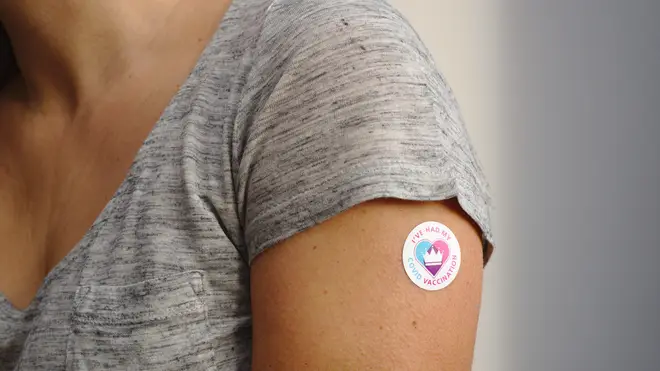
Ben Kentish 10pm - 1am
4 August 2021, 09:28

Fully vaccinated people are three times less likely than unvaccinated people to test positive for Covid-19, according to the latest data.
The findings from the latest report of the React Study found that infections in England have increased fourfold between 20 May and 7 June, but that spread of the virus was slowing as of 12 July with infection rates for unvaccinated people three times higher than in the fully vaccinated.
The data also suggested that double vaccinated people are less likely to pass on the virus to others.
Professor Steven Riley, co-author of the study and professor of infectious disease dynamics at Imperial College London, told LBC on Wednesday: "Across all of the positives, when we look at the vaccinated versus the unvaccinated, we definitely see a sign that infection is slightly weaker in the vaccinated positive. There is definitely a sign of that.
"But it is not as clear-cut as the actual prevention of getting infected."
Read more: Ever Given: Ship that blocked Suez canal finally arrives in Felixstowe
Read more: Great Britain's team pursuit reign comes to an end after chaotic Denmark crash
Vaccine Deployment Minister Nadhim Zahawi said: “Today’s results show the positive impact of the vaccination programme with those who are double jabbed three times less likely than unvaccinated people to get the virus and less likely to pass on this awful disease to those around them.
“We must continue our phenomenal progress – my message to anyone who has not yet been vaccinated is please come forward, to protect yourself, your family and your community.”

React study author speaks to LBC
The REACT-1 study by Imperial College London and Ipsos MORI is one of the country’s largest studies into Covid-19 infections in England.
Over 98,000 volunteers took part in the study in England between 24 June and 12 July to examine the levels of coronavirus in the general population.
Read more: Weather: 14 hours of storms to batter UK ahead of weekend, Met Office warns
Read more: New York Governor Andrew Cuomo sexually harassed multiple women, report finds
The latest round of data suggested that approximately one in 160 people in England were currently infected with the virus, with fully-vaccinated people estimated to have between 50 and 60 per cent reduced risk of infection.
Other findings included an estimated R number of 1.19, and that 100 per cent of samples sequenced for variants were the Delta variant.

Health commentator tells LBC it looks like we're over the Covid wave
Vaccine uptake has fallen slightly in recent months, particularly in young people, with figures released last week showing that one in three young adults in England have not had a first dose.
The Government has welcomed the findings of the React Study but is urging caution as restrictions ease, and unvaccinated people are being encouraged to come forward and book their jabs.
All those aged 18 and over can book their vaccination through the NHS booking service, and all adults have been offered their first dose.
At the end of September, by which point all those over the age of 18 will have had a chance to be fully vaccinated, the government plans to make full vaccination a condition of entry to high risk settings where large crowds gather and interact - likely to include nightclubs.
Read more: Drug-related deaths in England and Wales reach record high
Read more: Nicola Sturgeon confirms Scotland to drop most legal Covid restrictions
“Our vaccination rollout is building a wall of defence that means we can carefully ease restrictions and get back to the things we love, but we need to be cautious as we learn to live with this virus,” said Health Secretary Sajid Javid.
“Today’s report shows the importance of taking personal responsibility by self-isolating if you are contact traced, getting tested if you have symptoms and wearing face coverings where appropriate.
“I urge anyone who has yet to receive a vaccine to get jabbed and take up both doses – the vaccines are safe and they are working.”